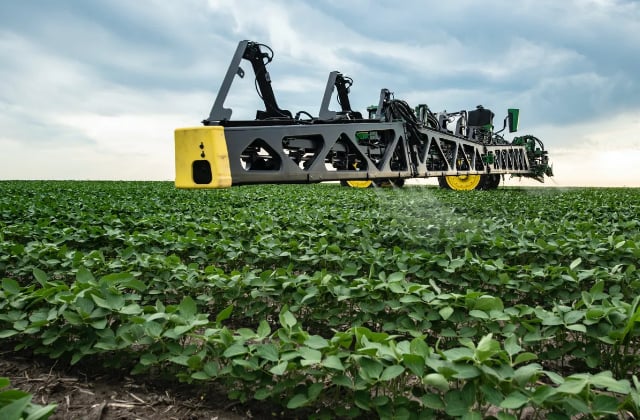November 13, 2025 | 03:04 GMT +7
November 13, 2025 | 03:04 GMT +7
Hotline: 0913.378.918
November 13, 2025 | 03:04 GMT +7
Hotline: 0913.378.918

John Deere is bringing more robots into the farm field with new technology that can precisely fertilize individual seeds.
As the global population soars past 8 billion people, the world faces a conundrum: There are more of us to feed, but our food needs to be grown on the same amount of land, if not less. At CES 2023, John Deere is pushing for a future in which farming relies ever more on sensors and machine learning technologies to meet those needs.
When you add in the realities of a changing climate that is shifting growing seasons and making weather patterns less predictable, it's clear that the farm of the future will require radical change. Enter the robots.
John Deere's latest foray into high-tech agriculture is a sensor-driving robotic technology called ExactShot that's designed to reduce fertilizer use by as much as 60%, saving farmers money and slashing the amount of excess chemicals that go into the ground.
Instead of shooting a steady stream of fertilizer into the soil over the seeds as they're planted in rows by machinery, the company's ExactShot technology uses sensors and robotics to send out timed bursts of fertilizer that coat individual seeds, leaving the spaces between them fertilizer-free.
That efficiency can keep unneeded fertilizer out of the ground where it can fuel the growth of weeds that pull nutrients away from crops or run off the field into waterways.
"Precision is key in agriculture because we're operating in huge quantities of acres and plants per acre," said Deanna Kovar, John Deere's vice president of production and precision agriculture production systems. "Eventually, we will literally treat every plant on an acre of a field differently based on what we're learning through our computer vision and machine-learning tech."
The new fertilizing tech is the latest example of using "robotics and sensing to help farmers grow more with less," Kovar said.
John Deere said its ExactShot system will be available to farmers in time for this year's spring planting.
While farming might not be the first thing you think of when it comes to technology, it's nothing new for John Deere. The Moline, Illinois-based company, founded in 1837, has become increasingly tech focused in recent years. At last year's CES, it unveiled a line of fully autonomous tractors.
After acquiring a majority stake in battery company Kreisel, John Deere is also using this year's show to push into EV technology, unveiling its first electric-powered excavator designed for city worksites. The excavator was built to reduce both noise pollution and emissions on construction sites. But don't expect huge battery-powered tractors just yet.
"One of our bigger tractors, the 8R... if we were to use a battery to power that, the battery would be twice the size of the machine," Kovar said.
Also on display at John Deere's CES booth is a massive crop-sprayer featuring John Deere's See & Spray technology.
See & Spray, which debuted last spring, uses a system of cameras and image recognition to determine the difference between crops and weeds so that the machine will only spray herbicides on the plants that it wants to get rid of, reducing the use of chemicals.
(Cnet)

(VAN) FAO Director-General conveys message at General Plenary Leaders Dialogue at Climate Summit in Brazil.

(VAN) Much has been said about the threat to European broiler meat industry from the EU-Mercosur deal, while the potential impact on egg segment is largely neglected, said National Chamber of Poultry and Feed Producers.

(VAN) There’s an old climate joke that goes, 'You may not believe in climate change, but your insurance company does'.

(VAN) Probiotics have emerged as a promising tool in poultry production, offering a natural and effective means to enhance the health and productivity of poultry.

(VAN) Interview with Kaveh Zahedi, FAO’s Director for Climate Change, Biodiversity and Environment.

(VAN) China has begun purchasing U.S. farm products after leaders of both countries met last week, but traders await soybean purchases after the White House said Beijing pledged to buy 12 million tons by year-end.

(VAN) The State of Food and Agriculture 2025 report focuses on land degradation caused by human activities.